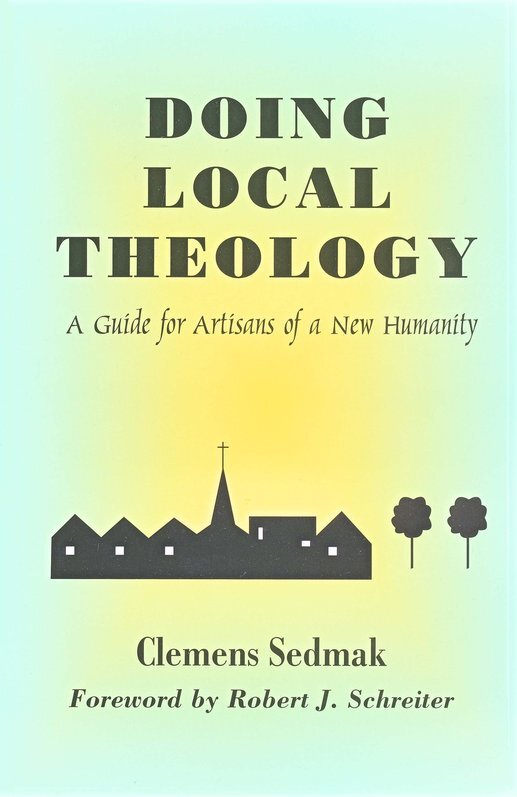Clemens Sedmak, Doing Local Theology: A Guide for Artisans of a New Humanity (Faith and Cultures Series). Orbis Books, 2002.
Referenced in: Theology of Ministry, Localized Theologies/Contextualization
LifeandLeadership.com Summary
There is a strong emphasis in missional church practice in constructing “local theologies.” Others refer to this as contextualization. This text by Sedmak, alongside the weightier academic work by Robert Schreiter’s Constructing Local Theologies, are frequently recommended guides in this process. As an Orbis publication, one can expect Catholic underpinnings, but the insights apply to other faith traditions. Those more interested in a strictly evangelical approach should consult Dean Flemming’s Contextualization in the New Testament, and Tim Tennent’s Theology In the Context of World Christianity.
Doing local theology means two things. First, doing a substantive (research-based), personal (experience-based), and contemplative (pastoral prayer-based) assessment of the unique cultural features of one’s ministry context (i.e. where you are doing ministry). Second, translating the message of scripture in “local tongue, in language that can directly engage the hearts of minds of its hearers.” (viii) It operates from this perspective:
“Whenever we do theology, we do theology from somewhere. We are somewhere, and we take positions. We are embedded in a form of life, here and now. This is our human situation. ‘Religion only exists in the vernacular,’ or to adapt a biblical phrase, the ‘treasure’ only exists in ‘earthen vessels’” (2 Cor. 4.7)
…We know that the context within which theology takes place shapes the form and influences the content of theology. Doing theology in a political setup of suppression, exploitation, and structural injustice will lead to different results than a theology that comes out of well-protected academic research situations. …Doing theology with sick and old people will take a different form than doing theology with managers and business people.
In preparing a sermon we all know that we have to take into account the community with whom we want to share our thoughts – are we talking to university students or a kindergarten class or a rural community? When we write a letter we think of the addressee first. This is a matter not only of politeness but of mere common sense. In this sense, there is nothing – nothing whatsoever – spectacular about the concept of local theologies and the idea of doing local theology. Whenever we do theology, we do theology ‘from somewhere.’” (3-4)
This does not deny that there are transcendent teachings of scripture that are objectively true, but these objective truths must be expressed in ways that address the chief intersections between biblical truth and life in a specific context.
Sedmak equips church leaders in the task of constructing local theologies. He includes some very helpful features, such as summarizing the important themes of the book in fifty theses. These theses are introduced in each successive chapter, and then listed as a whole in the appendices. Also, his style of writing is to introduce a concept (usually one or more of the fifty theses), then a tool on how to bring the concept(s) into practice, then an exercise to practice using the tool. Throughout, he gives examples of people who have grappled with the work of local theology.
The general stream of the book is first to introduce the notion of “walking, talking, and doing theology.” This leads into a description of Jesus as one who did this in his own ministry. Sedmak then suggests how we may do theology in appreciative dialogue first with our own faith tradition, second with local culture, and third with the larger social structures. What results is a “little theology” that may be communicated through images, proverbs, stories, and examples.
Whether one views this in the actual terms of the text, i.e. “doing local theology,” or simply uses this as a tool for learning how to be more pastorally sensitive to the unique faith issues of one’s ministry contexts, this book is valuable. It is not written for academics, but for ministry practitioners. Those who want a more theoretical framework should see Robert J. Schreieter’s Constructing Local Theologies.
From the Publisher
Doing Local Theology presents the construction of “local theologies” as an enterprise that’s not just for specialists. This exciting and practical book promises to become a standard in courses on theological method and foundations of ministry.
About the Author
Clemens Sedmak is professor of philosophy at the University of Salzburg.
***For additional information on this resource, including reviews, click the bookstore links. Check the reference at page top or the links below for resource guides on related topics.***
Related Ministry Resource Guides:
- Missional Perspectives 01, Introduction
- Missional Church Resources, Introduction and Index
- Missional Philosophy
- Theology of Mission
- Missional Communities
- Missional Leadership / Missional Strategies
- Missional Lifestyle, Discipleship, Spirituality
- Church Leadership and Renewal, Index to Resources
- Ecclesiology
- Evangelism
See Resources on Over 100 Areas of Ministry Leadership:


